5 Plotlines Where The Creators Secretly Trolled People
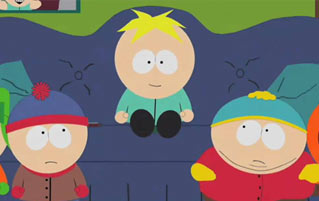
What's the point of having a massive, loyal audience if you can't use that power to settle petty scores and/or randomly insult your peers? Here are some examples of TV writers taking full advantage of this power.
The Most Violent Early Episode Of The Simpsons Was A "Fuck You" To Congress
It's easy to forget how shocking The Simpsons was when the show first debuted roughly 900 years ago, to the point where even the president referred to it as a corrupting influence on the culture. Bratty children? Mild cursing? A dysfunctional family that loves each other no matter what?! Get this unrealistic crap off our TVs!
The network and even members of Congress got involved and asked the writers to tone it down. The Simpsons' response:
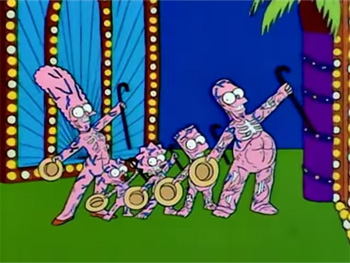
This confirms our long-held theory that the Simpsons don't have hair, just oddly shaped heads.
Yep, if you ever wondered why the hell the classic "Treehouse Of Horror V" ends with the whole family getting turned inside-out and performing a musical number in their own guts, there's your answer. In fact, the entire episode was meant as a giant, bloody middle finger to the show's pearl-clutching critics.
According to former showrunner David Mirkin in the Season 6 DVD commentary, back in 1994, The Simpsons was getting a lot of pressure to become less ... Simpsons-like. First, Fox straight-up told Mirkin to stop using Itchy and Scratchy on the show because they were too violent, to which he reacted by devoting an entire episode to the cat and mouse duo ("Itchy And Scratchy Land," a Westworld parody).

As in Westworld the movie, not the show, hence the lack of genitalia on the robots.
Then, according to Mirkin, a group of concerned parents managed to get some members of Congress to condemn the show's violence. Displaying a remarkable lack of self-preservation instincts, Mirkin decided to go all-out and create the most blood-filled, organ-crunching, stomach-churning, blood-splattering episode in the entire series to that point. The show opens with Marge announcing that this year's Halloween special has been cancelled by Congress, only to move on to various atrocities, such as Milhouse being thrown into a giant blender, the children being chopped up by the school faculty and eaten, and Groundskeeper Willie being ax-murdered not once ...

... not twice ...

... but three times, once by Maggie (guest-voiced by James Earl Jones).
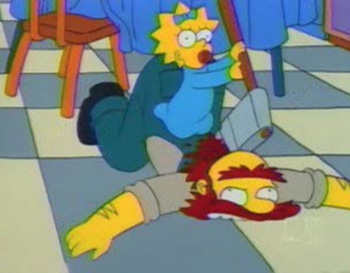
Oddly enough, this is the only one that's completely in character.
Perhaps not coincidentally, this was Mirkin's last year as showrunner, though he's still involved with the show as a producer. So that's what happens when you mess with Fox and Congress: You end up incredibly rich for doing nothing.
Ren & Stimpy's Writers Created An Entire Episode To Mock The Show's Creator After He Was Fired
Ren & Stimpy was the classic cartoon about a Chihuahua and a cat that was also occasionally about a toast-themed superhero or log. Just, log. Believe it or not, the guy who first came up with this idea wasn't the most stable person in the world.
Animator John Kricfalusi was as reliable and easy to work with as his last name was pronounceable -- he was constantly running behind schedule, going over budget, and generally being a pain in the ass for the network. When Kricfalusi took his sweet time to deliver an episode so insane that Nickelodeon couldn't even air it (which he refused to replace), he got fired from his own show.

Do these look like the glasses of a reasonable man?
Deciding to go down in an avalanche of sour grapes, Kricfalusi began openly badmouthing the show, which continued being produced without him. He mocked the animators who stayed behind, saying that letting them take over the series was like handing it to "milkmen." What Kricfalusi should have foreseen was that his former colleagues were exactly as spiteful as he was, and were perfectly willing to get back at him through his own creation.
The episode "Reverend Jack" features Ren and Stimpy going to work for a bespectacled egomaniac who sells meat but is utterly unreliable and never finishes his work on time. In a particularly bizarre scene, the eponymous reverend carefully builds sandwiches on top of Ren and Stimpy's heads -- much like something Kricfalusi had done while drunk at a party.

We're sure this was the only time a scene from this show was conceived in such a state.
One of the show's directors called the episode "a love letter to John" ... in which he acts like an asshole, gets fired, and goes on a pathetic tirade against the people who replaced him. To rub salt in the wound, the writers even included phrases Kricfalusi had been heard to say in real life, except devoid of context, turning them into non-sequiturs. Yeah, they were indistinguishable from the rest of the show's dialogue.
And finally, remember that dig that compared the animators to milkmen? Well, here's the logo those animators put at the end of every episode after Kricfalusi left:
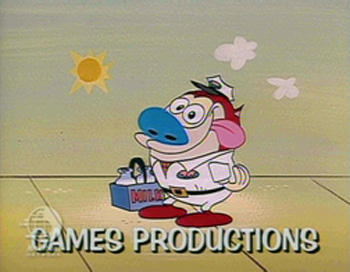
Subtle.
A Bond Villain Was Modeled After The Daily Mirror's Corrupt Former Owner
Over the years, James Bond's villains have included an international terrorist who lives in a volcano, a genocidal maniac with a space station, and, uh, a guy who sells newspapers. In Tomorrow Never Dies, Bond faces off against Elliot Carver, an evil media magnate whose plan is to almost start a war between the UK and China so he can ... sell newspapers in China. Actually, that might be the most feasible Bond villain plan ever.

Though it's a little weird that he explains it in the form of a 45-minute TED talk.
If Carver seemed more realistic than other action movie baddies, that's because, in a sense, he was real. He was based on Robert Maxwell, a corrupt British media mogul. Maxwell became infamous when details emerged that he had been embezzling hundreds of millions from the pension funds of the employees at The Daily Mirror, a newspaper he ran. He then singlehandedly squandered the funds, leaving countless innocent people without their life savings. It turns out that when the guy in charge of your company openly talks about your pension money as "his" fund, he's probably up to no good.

"That's right, I wrote all the articles and took all the photos. I even drew the terrible comic."
Also like Carver, Maxwell was known to have a vicious temper, which he often took out on his long-suffering wife (though he never killed her like in the movie, so you gotta give him some credit). However, the most obvious allusion the writers made to this real-life supervillain was the manner surrounding his demise. No, he wasn't dropped into a chimney, sadly. As the details of Maxwell's fraud were coming to light, he managed to escape prosecution by mysteriously dying in a yachting accident. In the movie, after Carver is sea-drilled to death by a certain martini-slugging STD-machine, MI6 releases a cover story that he died in a yachting accident. Because as the old saying goes: "The bigger the boat, the more they believe."
South Park's Butters Is Basically The Creators Bullying One Of Their Co-Workers
In its more than 20 years on the air, South Park has mercilessly mocked everything from religion to Tom Cruise to the government to Tom Cruise again to themselves. And by "themselves," we don't mean the series' creators, Matt Stone and Trey Parker, but their animation director and producer Eric Stough. He's the Butters of the group, in more than one sense.

These "cartoon characters drawn in realistic style" memes are kind of disturbing.
In the show, Butters Stotch is a generally good-natured, anxious little boy who inevitably ends up getting thrown into extremely fucked-up situations (like being almost murdered by his parents or accidentally causing the murder of the Kardashians). As it turns out, Butters wasn't added to the show out of a desire to have a more rounded cast -- it was the creators' way of messing with their co-worker. Apparently, as they worked on the show, Stough started getting on Parker and Stone's nerves with his mild-mannered demeanor and unbearable politeness, so they began picking on him. They'd call him "our little buddy" (which over the years morphed into Butters), mock his voice, and generally do everything short of trapping him inside a locker.
It was only a matter of time before they decided to take this heart-warming instance of workplace bullying to the next level by turning Stough into a character for the other kids to torment. Basically, Butters is Stough if he was an eight-year-old who inexplicably lacked a nose and ears.

Presumably they'll get around to doing an episode dealing with the juvenile leprosy that plagues that town.
While he was firmly opposed to the idea at first, and specifically told Parker and Stone not to add him to the show, today Stough seems to regard Butters' existence as a harmless bit of friendly ribbing. Yeah, you know, that classic prank where your friends tell millions of people your dad cheats on your mom with other men and they're both terrible people who psychologically abuse you on a daily basis.

But at least his cartoon self itself is always portrayed in a respectful manner.
Aaron Sorkin Dedicated An Episode Of The West Wing To Getting Back At Message Board Users He'd Had A Flame War With
We've all been there. You find yourself involved in some online discussion about who was the best Star Trek captain or something (it's Joel), and somehow it goes from you saying "I respectfully disagree with your opinion, good sir" to "I HOPE YOU DIE IN A FIRE, YOU MOTHERLESS CUR." For most of us, we burn out our rage, wipe the fury-spittle off the screen, and go about our lives. Acclaimed screenwriter/producer Aaron Sorkin, however, took things to a whole new level when he dedicated an episode of The West Wing to getting back at some randos with whom he'd had a cyber-argument.
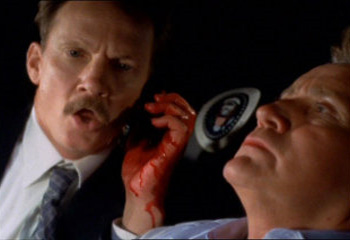
The episode in which President Bartlet gets shot was Sorkin's way of getting back at Martin Sheen for not accepting his AIM invitation.
It all began when Sorkin noticed his show was being discussed on the website Television Without Pity. Unfortunately they weren't, as he presumably hoped, discussing how awesome Aaron Sorkin was -- instead, they were ragging on him for not acknowledging his co-writer Rick Cleveland's work on the series whilst accepting an Emmy, and being an all-around glory-hogging, floppy-haired a-hole.
Naturally, Sorkin signed in to defend his internet honor, and things went downhill from there. His worst messages have been lost to the sands of time, but here's a recap by another poster:
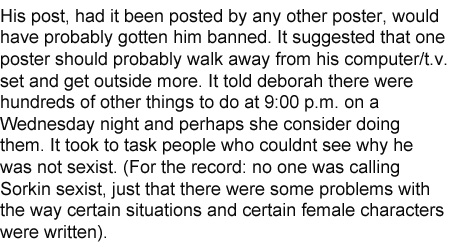
Bear in mind that this was before GIFs became commonplace, so you had to type out your shocked reactions.
At one point, Sorkin had passive-aggressively dissed his co-writer on the Emmy-winning show, saying he did all the work himself and basically credited the other dude out of the kindness of his heart. Once said co-writer showed up on the forum, Sorkin apologized and left the website. After all, he was an adult with work to do, and didn't have time to be childish on message boards.
And by "work," we mean writing a West Wing episode about message boards. In "The U.S. Poet Laureate," the character Josh Lyman discovers a website where people are discussing him. He takes umbrage at what's being said, logs on to have a calm discussion, and gets sucked into an unfair debate with what the show describes as chain-smoking basement-dwellers and mentally unstable, muumuu-wearing losers.
One character even repeats some phrases from Sorkin's final message board post. To recap, Aaron Sorkin, one of Hollywood's most lauded creators, dedicated an episode of a critically acclaimed show to get back at random posters who'd called him mean names by calling them even meaner names to millions of viewers. So if you see any particularly pretentious posters in this article's comments section, be sure to tell them that A Few Good Men ruled.
Also check out 5 Villains That Were Thinly-Veiled Versions Of Real People and 6 Famous Works of Art You Didn't Know Were Vicious Insults.
Subscribe to our YouTube channel, and check out 6 Famous Characters That Are Secretly Insults, and other videos you won't see on the site!
Follow us on Facebook, and we'll follow you everywhere.
What the Hell Did I Just Read: A Novel of Cosmic Horror, the third book in David Wong's John Dies at the End series, is available now!
